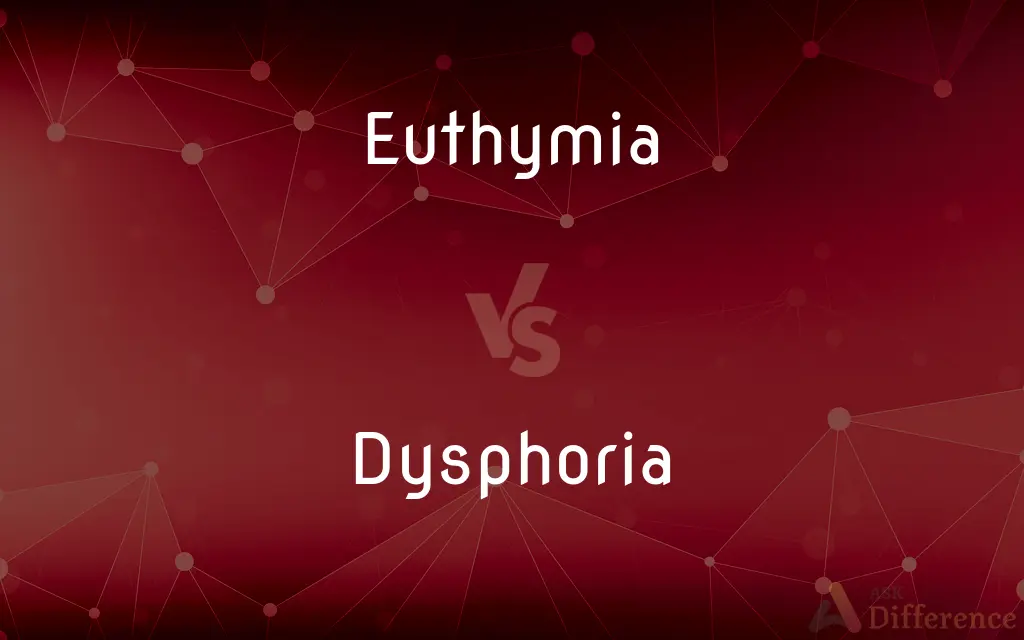Euthymia vs. Dysphoria — What's the Difference?
By Maham Liaqat & Fiza Rafique — Updated on April 17, 2024
Euthymia refers to a stable emotional state, while dysphoria is characterized by profound feelings of unease or dissatisfaction.

Difference Between Euthymia and Dysphoria
Table of Contents
ADVERTISEMENT
Key Differences
Euthymia is often described as a normal, stable mood where an individual experiences emotional balance and resilience. Whereas dysphoria is marked by a pervasive state of dissatisfaction, restlessness, or anxiety, significantly impacting one's emotional and psychological well-being.
Euthymia allows individuals to function effectively in daily life without significant emotional disruptions. On the other hand, dysphoria can lead to difficulties in concentration, decision-making, and maintaining normal routines, often necessitating medical or psychological intervention.
In euthymia, people generally report feeling neither excessively happy nor sad; their emotional state is typically in line with their circumstances. In contrast, dysphoria often involves feelings that are disproportionate to one's circumstances, which can include intense irritability, sadness, or indifference.
Euthymia is considered a goal in the treatment of mood disorders, such as bipolar disorder, where maintaining a euthymic state is indicative of successful management. Conversely, dysphoria is often a symptom that needs to be addressed in various conditions, including depression, bipolar disorder, and gender dysphoria.
People experiencing euthymia are often perceived as emotionally stable by others, which aids in forming and maintaining personal and professional relationships. While those experiencing dysphoria may struggle with social interactions, which can exacerbate feelings of isolation or alienation.
ADVERTISEMENT
Comparison Chart
Definition
A state of psychological well-being and stability.
A profound state of unease or dissatisfaction.
Symptom Presence
No significant mood symptoms.
Presence of distressing symptoms like sadness or irritability.
Impact on Functioning
Generally does not impair functioning.
Often impairs social, occupational, or other important areas of functioning.
Treatment Goal
To achieve or maintain in mood disorders.
To alleviate symptoms in various psychological conditions.
Associated Conditions
Often a target state in bipolar disorder management.
Common in depression, anxiety, and gender dysphoria.
Compare with Definitions
Euthymia
Absence of mood swings.
His euthymia made him a reliable team member.
Dysphoria
A state of unease or generalized dissatisfaction with one’s current condition.
Dysphoria clouded his thoughts daily.
Euthymia
A stable emotional state.
After years of mood swings, he finally achieved euthymia.
Dysphoria
A barrier to social and occupational functioning.
His dysphoria made social interactions very challenging.
Euthymia
Emotional equilibrium or balance.
Yoga and meditation helped her maintain euthymia.
Dysphoria
General dissatisfaction with life.
She felt an intense dysphoria despite her successes.
Euthymia
Target state in bipolar disorder treatment.
The medication helped her reach euthymia.
Dysphoria
Often associated with depression and anxiety.
The doctor diagnosed her malaise as dysphoria.
Euthymia
Psychological well-being.
Regular therapy sessions contributed to his psychological euthymia.
Dysphoria
Common in psychological disorders like gender dysphoria.
Gender dysphoria was a struggle he faced silently.
Euthymia
(psychology) A normal, non-depressed, reasonably positive mood; serenity
Dysphoria
Dysphoria (from Greek: δύσφορος (dysphoros), δυσ-, meaning difficult; and φέρω, pherō meaning "to bear") is a profound state of unease or dissatisfaction. It is the opposite of euphoria.
Dysphoria
An emotional state characterized by anxiety, depression, or unease.
Dysphoria
A state of feeling unwell or unhappy; a feeling of emotional and mental discomfort and suffering from restlessness, malaise, depression or anxiety.
Body dysphoria, premenstrual dysphoria, weight dysphoria
Dysphoria
(LGBT) gender dysphoria
Dysphoria
Impatience under affliction; morbid restlessness; dissatisfaction; the fidgets.
Dysphoria
Abnormal depression and discontent
Common Curiosities
What is euthymia?
Euthymia is a state of stable emotional well-being where a person experiences emotional equilibrium.
How does euthymia affect daily life?
Euthymia allows individuals to function effectively and manage daily activities without emotional disruptions.
What is dysphoria?
Dysphoria is a profound state of unease or dissatisfaction often associated with emotional and psychological discomfort.
What are the common symptoms of dysphoria?
Common symptoms include persistent sadness, irritability, and a general sense of dissatisfaction.
Can both euthymia and dysphoria be present in the same individual?
Typically, euthymia and dysphoria represent opposite emotional states, but individuals may fluctuate between these states, particularly in mood disorders.
How is euthymia achieved in clinical settings?
Achieving euthymia often involves a combination of medication, therapy, and lifestyle adjustments.
What types of disorders are associated with dysphoria?
Dysphoria is commonly seen in disorders such as depression, anxiety, and specific conditions like gender dysphoria.
What is the prognosis for someone experiencing dysphoria?
Prognosis can vary widely but improving with appropriate treatment and support.
Is dysphoria always related to mental health conditions?
While often related to mental health issues, dysphoria can also arise from situational factors like chronic stress or life transitions.
How do healthcare professionals assess euthymia?
Assessment typically involves evaluating emotional stability and absence of mood symptoms over a period.
Are there specific therapies recommended for euthymia maintenance?
Maintenance therapy, particularly for bipolar disorder, may involve mood stabilizers and psychotherapy to sustain euthymia.
Can lifestyle changes impact dysphoria?
Yes, lifestyle changes such as regular physical activity, sufficient sleep, and a healthy diet can help manage symptoms of dysphoria.
What role does therapy play in managing dysphoria?
Therapy can help individuals understand and cope with dysphoric feelings, providing strategies to alleviate them.
What are the long-term effects of untreated dysphoria?
Untreated dysphoria can lead to significant personal, social, and occupational challenges.
How can friends and family support a person in euthymia?
Support can involve encouraging adherence to treatment plans and fostering a stable environment.
Share Your Discovery

Previous Comparison
Direct vs. Terse
Next Comparison
Anger vs. RileAuthor Spotlight
Written by
Maham LiaqatCo-written by
Fiza RafiqueFiza Rafique is a skilled content writer at AskDifference.com, where she meticulously refines and enhances written pieces. Drawing from her vast editorial expertise, Fiza ensures clarity, accuracy, and precision in every article. Passionate about language, she continually seeks to elevate the quality of content for readers worldwide.
















































